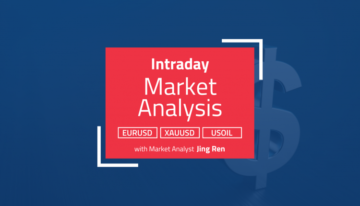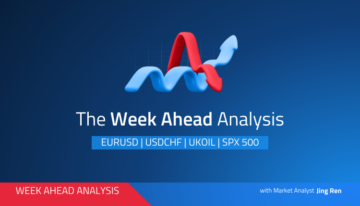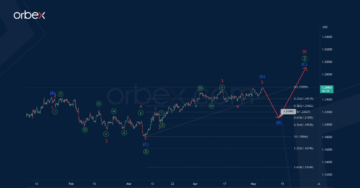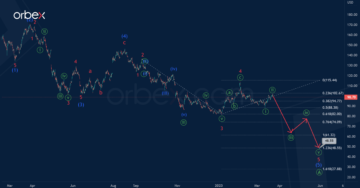The ECB is facing a complicated scenario that makes it harder to figure out what they will do with policy. In turn, that makes the future of the Euro somewhat uncertain. Short-term volatility might remain the theme for the currency unless there is a surprise in the data coming out later this week. That also might be pivotal for whether the Euro can regain some momentum, or will keep sliding against the dollar.
According to the latest poll of economists conducted by Reuters, a very slim majority of 53% expect the ECB to keep rates unchanged at the next meeting. That would be the first “pause” since the start of the hiking cycle last year. That view is seen weakening the Euro, but it is such a shaky consensus that a small deviation from the forecasts in the data could easily change the forecast for ECB action.
What’s Coming Up?
This week is the release of preliminary CPI figures for the Eurozone. Recently, they have seen stronger revisions, but the market still tends to react strongly to the preliminary version. As is typical, the major economies report first, which sets the tone for expectations for the whole Eurozone. Thus, we could get the biggest market reaction on Wednesday, when Germany reports its CPI figures. That is unless there is a major surprise in the full Euro Area reports on Thursday.
German inflation is expected to barely change, slipping to 6.1% from 6.2% prior. This despite Germany also barely escaping from a technical recession early this year by having an essentially stagnant economy. The harmonized rate, which adjusts for comparisons for the rest of the Eurozone, is expected to be a little worse, at 6.3% compared to 6.5% prior. On a monthly basis, the change in prices is expected to be the same as the prior month at 0.3%
The Other Key Data Points
French inflation is also expected to barely change, ticking down to 4.2% from 4.3% prior. But that includes a monthly acceleration to 0.4% from 0.1% prior. The relatively small change in both France and Germany is setting up expectations that inflation in the Eurozone will remain high, as has been the theme through the summer. Higher food and fuel prices have been a concern for consumers; and so the hope for policymakers might be that the core rate continues to decline.
Eurozone Flash PMI for August is expected to come down to 5.0% from 5.3% prior. This, of course, more than doubles the target rate. The core inflation rate is expected to remain higher at 5.3%, but down from 5.5% prior. The slowing in the pace of the descent in inflation could make ECB policy makers worried that not enough has been done to bring down inflation. A core rate of above 5.5% would likely set off alarm bells, as it would mean that prices have continued an increasing trend for four months.
Inflation above expectations would likely lead to the market to suspect that the ECB will take more action. With the Fed widely expected to hold steady in September, this could give the Euro a bit of a boost. On the other hand, the default is the expectation that inflation will continue lower which will give the ECB room to keep policy steady. With unemployment high and the economy sputtering, the market might be reinforced in thinking that the shared central bank will only raise rates unless forced to by inflation.
Trading the news requires access to extensive market research – and that’s what we do best.
- SEO Powered Content & PR Distribution. Get Amplified Today.
- PlatoData.Network Vertical Generative Ai. Empower Yourself. Access Here.
- PlatoAiStream. Web3 Intelligence. Knowledge Amplified. Access Here.
- PlatoESG. Automotive / EVs, Carbon, CleanTech, Energy, Environment, Solar, Waste Management. Access Here.
- PlatoHealth. Biotech and Clinical Trials Intelligence. Access Here.
- ChartPrime. Elevate your Trading Game with ChartPrime. Access Here.
- BlockOffsets. Modernizing Environmental Offset Ownership. Access Here.
- Source: https://www.orbex.com/blog/en/2023/08/eurozone-august-inflation-and-ecb-hike
- :has
- :is
- :not
- $UP
- 2%
- a
- above
- acceleration
- access
- Action
- against
- alarm
- also
- an
- and
- app
- AREA
- AS
- At
- AUGUST
- Bank
- basis
- BE
- been
- bells
- BEST
- Biggest
- Bit
- Blog
- boost
- both
- bring
- but
- by
- CAN
- central
- Central Bank
- change
- come
- coming
- compared
- complicated
- Concern
- conducted
- Consensus
- Consumers
- continue
- continued
- continues
- Core
- core inflation
- could
- course
- CPI
- Currency
- cycle
- data
- Decline
- Default
- Despite
- deviation
- do
- Dollar
- done
- doubles
- down
- Early
- easily
- ECB
- economies
- economists
- economy
- enough
- essentially
- Ether (ETH)
- Euro
- Eurozone
- expect
- expectation
- expectations
- expected
- extensive
- facing
- Fed
- Figure
- Figures
- First
- Flash
- food
- For
- For Consumers
- forced
- Forecast
- forecasts
- forex
- Forex Trading
- four
- France
- from
- Fuel
- full
- future
- Germany
- get
- Give
- hand
- harder
- Have
- having
- High
- higher
- Hike
- hiking
- hold
- hope
- HTTPS
- image
- in
- includes
- increasing
- inflation
- inflation rate
- IT
- ITS
- Keep
- Key
- Last
- Last Year
- later
- latest
- lead
- likely
- little
- live
- lower
- major
- Majority
- make
- Makers
- MAKES
- Market
- market reaction
- market research
- mean
- meeting
- might
- Mobile
- Mobile app
- Momentum
- Month
- monthly
- months
- more
- news
- next
- of
- off
- on
- only
- or
- Other
- out
- Pace
- pivotal
- plato
- Plato Data Intelligence
- PlatoData
- pmi
- policy
- Policy Makers
- policymakers
- poll
- Prices
- Prior
- raise
- Rate
- Rates
- React
- reaction
- recently
- recession
- regain
- relatively
- release
- remain
- report
- Reports
- requires
- research
- REST
- Reuters
- revisions
- Room
- s
- same
- scenario
- seen
- September
- set
- Sets
- setting
- shared
- short-term
- since
- sliding
- slipping
- Slowing
- small
- So
- some
- somewhat
- start
- steady
- Still
- stronger
- strongly
- such
- summer
- surprise
- Take
- Target
- Technical
- tends
- than
- that
- The
- the Fed
- The Future
- theme
- There.
- they
- Thinking
- this
- this week
- this year
- Through
- thursday
- Thus
- ticking
- to
- TONE
- Trading
- Trend
- TURN
- typical
- Uncertain
- unemployment
- URL
- version
- very
- View
- Volatility
- we
- Wednesday
- week
- What
- when
- whether
- which
- whole
- widely
- will
- with
- worried
- worse
- would
- year
- zephyrnet













